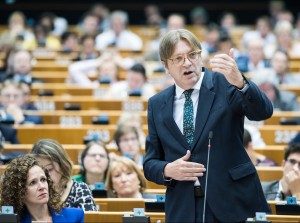Who’s irresponsible now?
“That country now has collapsed — politically, economically, monetarily and constitutionally, and you will have years ahead of you to get out of this mess.”
Dutch prime minister Mark Rutte’s hyperbole can be understood given the heated atmosphere in the European Parliament where he was addressing UK MEPs including Brexiteer Nigel Farage. But — for the sake of its own citizens — the diminished EU would be better advised to reflect on its own future.
Indeed, the UK’s decision to leave the EU has acted as something of a mirror for remaining member states, where support for the union enjoyed a bounce in opinion polls conducted in the immediate aftermath of the Brexit vote, possibly as electorates saw the chaotic financial aftermath of the surprise referendum result.

How will EU leaders themselves respond? The head of the liberal group in the parliament, former Belgian prime minister Guy Verhofstadt, characterised the European Council’s attitude as “we shouldn’t change anything, just implement existing European policies” — which he condemned as “shocking and irresponsible”.
An early and portentous test will be whether, and if so how, the problems of Italy’s banking system are addressed. Here, “national specificities” — to borrow a Brussels euphemism — clash with a Bank Recovery & Resolution Directive that has been placed at the centre of the EU’s post-crisis financial architecture.
What will be sacrificed: principle, or Italian retail investors’ savings?
Perhaps compromise is in the air: a European Banking Authority decision on 1 July to split Pillar 2 and thereby ease coupon payment concerns in the AT1 market looks like nothing less than a U-turn, albeit dressed up in face-saving language.
Can Europe’s leaders perform a similar trick? With Italy’s own referendum — on constitutional reform — due by November, the clock is ticking.
Neil Day, Managing Editor
Photo: Guy Verhofstadt, Source: European Parliament 2016 – European Parliament
